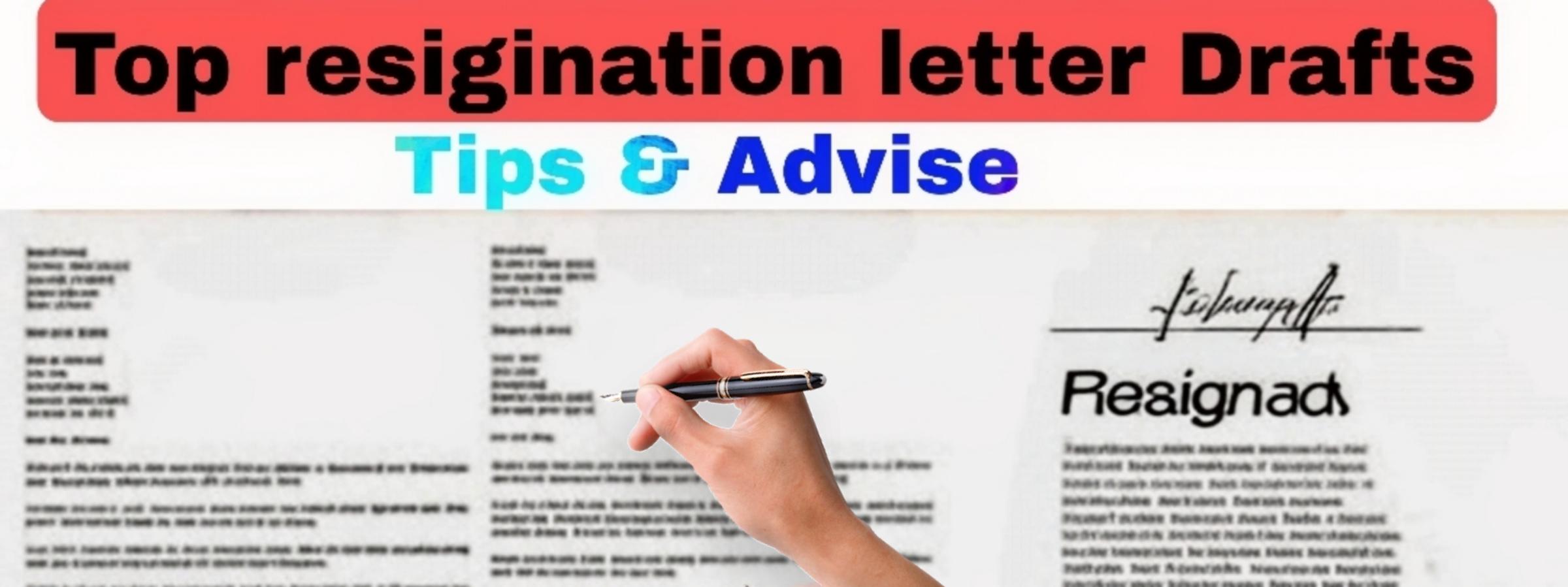
How to Write a Professional Resignation Letter and Quit Your Job Gracefully
Learn how to write a professional resignation letter and leave your job gracefully with our step-by-step guide. Protect your reputation, maintain relationships, and ensure a smooth career transition.
Table of Contents
- Part 1: The Basic Mindset—Knowing the "Why" Behind Quitting a Job
- Part 2: The Pre-Resignation Protocol: Setting Up a Smooth Transition
- Part 3: How to Write a Perfect Resignation Letter
- Part 4: The Last Act: What to Do During the Notice Period
- Part 5: Moving On and Protecting Your Legacy
- Conclusion: The Graceful Exit as a Professional Signature
The choice to leave a job is a big step in a person's career and it may be exciting scary and confusing all at the same time. It means the end of one chapter and the start of another with hope. But the last impression you leave is probably just as important as the first one In today's interconnected professional world.
when industries are close-knit and reputations are easy to find, leaving a job in a polite and professional way is not just a kind thing to do; it's also a smart career move An exit that is handled with care and honesty, protects your professional identity , keeps important networks alive and makes sure that you can always go back to old doors if you need to
This all-in-one guide brings together the advice of career experts to create a complete step-by-step plan for quitting your job.
We will go beyond just writing a letter to include the important changes in attitude steps to take before quitting and behavior after quitting that will help you make this transition smoothly. Whether you're leaving for a dream job to get away from a bad situation or to grow as a person learning how to leave gracefully will help you throughout your career
Part 1: The Basic Mindset—Knowing the "Why" Behind Quitting a Job
Before you write a single word of your resignation letter, you need to know why quitting is crucial. It's not about being loyal to the organization; it's about how you feel.
- It is the most important part of your professional brand: Your reputation is the most important thing you have. Every move you make in the last few weeks of your job is a big deal . How you quit will be a big part of how your coworkers bosses and executives remember you A well-done resignation that shows thanks cooperation and continued good work builds a story of professionalism dependability and honesty On the other hand leaving on bad terms or suddenly can unfairly overshadow years of hard work and success You are the one who writes the story of your career Make sure the last chapter is classy
- It Protects Your Future References and Recommendations: Most of the time the recruiting process today includes checking references and backgrounds Your boss is the most likely person to provide you a reference in the future If you leave gracefully and offer to help with the transition there is a much higher chance that this former boss will write you a wonderful detailed recommendation If you left them better off they are much more likely to sing your praises This good reference could be what gets you a competitive job years down the line
- It's an investment in your network (the "good karma" principle): The business world is like a rotating door Your junior coworker today could be the hiring manager at your dream company tomorrow
- The client you worked with intimately might relocate to a field you want to work in five years from now Burning bridges has a long-term compound interest effect on your career but sadly it's negative interest
- You build your network by departing in a good way You never know when you'll see each other again If you treat everyone with respect on your way out you'll be able to shake hands and smile when you see them again instead of having closed doors and missed calls
- It gives you closure in your personal and professional life: If you quit professionally you can go with your head held high It gives you a sense of clean closure letting you psychologically and emotionally let go of your present job and totally accept your new one without any baggage regret or anger You can be proud of your time there since you finished strong and on your own terms
Part 2: The Pre-Resignation Protocol: Setting Up a Smooth Transition
Giving in your letter is merely the last step in a long process that started much earlier. Being prepared the appropriate manner protects you from making mistakes and makes sure you are in charge and sure of yourself.
Step 1: Be Completely Sure
Before you say "I quit" you have to be sure that you want to leave, If you get a counter offer after you resign it's bad for your career to take it back It. shows that you can't make up your mind which can make your boss less sure of your long-term dedication
Try to fix the problem within the company first if you're unhappy but not sure if you should leave Set up a meeting with your boss to talk about your worries whether they are about your career not moving forward projects you want to work on or your workload Bring forward helpful ideas First try all of these options.
You shouldn't use resignation as a way to get what you want Important Exception: These principles don't apply if you work in a place that is poisonous abusive or bad for your mental or physical health. Your health is the most important thing In these situations your goal is to get out of the situation as fast and safely as possible and a conventional two-week notice may not be practicable or safe
Step 2: Know What Your Contract Says You Have to Do
Get a copy of your original employment contract and read the parts that talk about how to end the contract and how much notice you need to give. Two weeks is the usual notice period while a month is customary for higher-level or specialized jobs, Know what you have to give by law and by ethics If you plan to keep this promise from the start it will shape how you act in a professional way and respect your agreement
Step 3: Get Ready for the Talk
Resigning is more than merely handing in a letter. Set up a private meeting with your direct boss that won't be interrupted. (If you can do this in person) , If you can't ,do it over video call. This deed shows bravery and respect Get your speech points ready before the meeting:
Your First Line: Be simple and direct "I need to talk to you about what I want to do here It was hard for me to decide to quit my job
Your Reason: Be ready with a short positive reason "I got an offer that fits perfectly with my long-term career goals in [field]" You don't have to explain or go into great depth about your choice.
The Last Day of Your Life: Clearly specify when you plan to leave your job which shows that you are following the rules for your notice period ·
Expect a counteroffer; most managers will try to keep you Choose how you will react ahead of time. The best answer is one that is simple polite and firm: "Thanks a lot for the offer, I appreciate the compliment but I've made up my mind I'm determined to make this change as easy as possible
Step 4: Keep Everything Very Private
Tell your employer first. Don't tell your close work friends, your team, or your clients ahead of time. People learn about a resignation extremely quickly, which can cause unnecessary worry, weaken morale, and make your manager look weak. After you've talked, let the leaders make the official announcement.
Part 3: How to Write a Perfect Resignation Letter
Your resignation letter is the formal record of your choice. It should be professional, brief, and positive. Here are the essential parts and some examples.
- The salutation and the header: Follow the format of a conventional business letter. Put your name title company and address as well as the date and the name of the person you're sending it to. Send the letter to your direct boss and copy it to the HR department ·
- Greeting: Use a greeting that is both official and familiar: “Dear [Mr/Ms Last Name]”
- The Statement of Intent (The First Paragraph): This is the letter's most crucial element Be clear Say what you want to say that you plan to quit and when your last day of work will be There should be no doubt "Please accept this letter as formal notification that I am resigning from my position as [Your Exact Job Title] with [Company Name] According to my employment agreement my last day of work will be [Date] which gives me [eg two weeks] notice
- The Thank You Note (The Second Paragraph): This is where you show that you care. Say thank you from the bottom of your heart for the chances you've been given. If you can be exact, talk about a skill you learned, a project you worked on that you remember, or how helpful your team was. This shows that you are humble and grateful. For example, "I want to say thank you from the bottom of my heart for the professional opportunities I've had while I've been here. I'm very grateful for the guidance you've given me and the chance to head the [Project Name] project, which taught me so much. For years to come, I will treasure the skills I've learned and the people I've met.
- The Offer of Transition Assistance (The Third Paragraph): Offer to help make the transition go smoothly This shows that you are professional and care about your team's success even after you leave · For example "I am completely dedicated to making sure the transition goes smoothly and in an orderly way I'm happy to help train my replacement write down my main tasks and ongoing projects and do whatever I can to finish my work before I go Please tell me how I can help you the most during this time
- The End and Signature: End on a good note and look to the future. Best of luck to the organization in the future. For example, "I wish you and everyone at [Company Name] the best for the future. I'm sure you'll keep doing well. With all my heart [Your Handwritten Signature] [Your Typed Name]"
Things You Should Never Do:
- Negativity: Don't use the letter to complain, criticize, blame, or say what you're worried about
- Too Much Information: Don't go into detail about your new job's compensation benefits or why it's better than your existing one
- Don't be too casual; maintain the tone professional. Don't use slang, make jokes, or talk too much about how you feel.
Part 4: The Last Act: What to Do During the Notice Period
How you act after you quit is the most significant test of your professionalism This is how people actually remember you
- Keep up (or even improve) your performance Don't give in to "short-timer's syndrome" Keep meeting your deadlines speaking out in meetings and doing all of your duties with the same level of zeal and commitment you usually had You want to end strong so that there is no doubt about how hard you work
- Make a detailed plan for the transition: This is perhaps the most important thing you can do This paper should help the person who comes after you and should have: · A list of all the important duties and chores that need to be done on a regular basis · Reports on the status of all active initiatives and what to do next · Important login information (should be given to your boss not the new person directly) · Important contacts (customers vendors and internal stakeholders) together with information about the relationship · Where to find critical files and papers. This approach shows a lot of professionalism and makes it very hard to find someone else to do your job which is precisely how you want to be remembered
- Help with Knowledge Transfer: Offer to educate your coworkers or your successor before they ask Schedule meetings to go over hard jobs with them Be patient and clear when you explain things Your supervisor will be more thankful if you make things simpler for them
- Thank People Individually: Take the time to thank each person who made your experience better, including coworkers, mentors, and even subordinates. A heartfelt "thank you" in person works really well. If you want to stay in touch with someone, offer to connect on LinkedIn and share your personal contact information.
- The Exit Interview: If HR does an exit interview, be just as professional. This is not the time to get back at someone. Instead of saying "My boss was awful," say "I think management could do a better job if they communicated more clearly and consistently." Be polite and stick to the facts.
Part 5: Moving On and Protecting Your Legacy
As you get about to leave for good, do two last critical things to secure your professional legacy.
- The "Compliment File": You should keep track of all the good things people say about you during your time at your former work place


